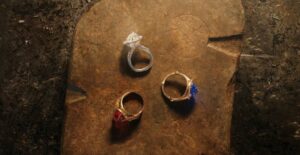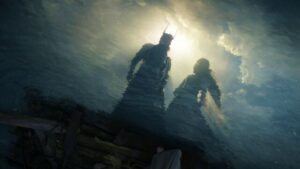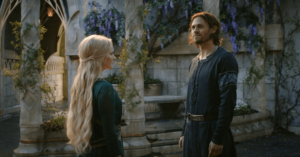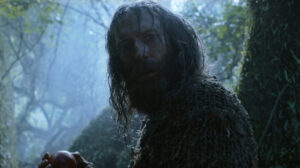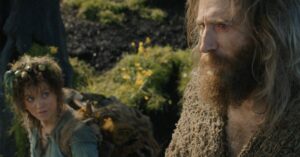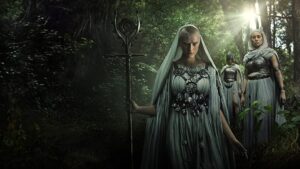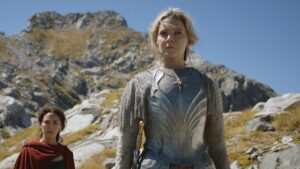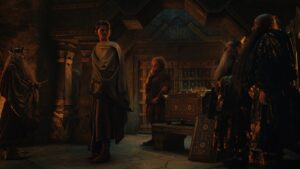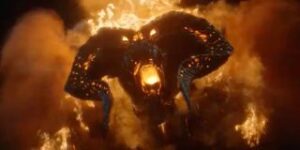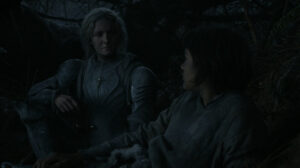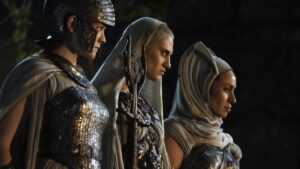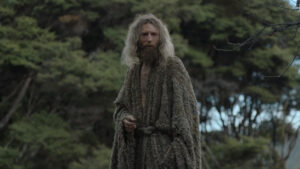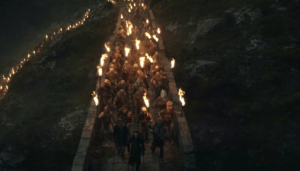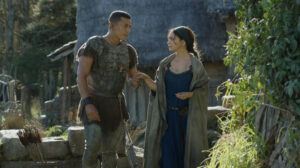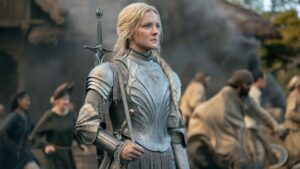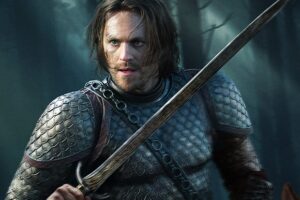POTENTIAL SPOILERS FOR THE RINGS OF POWER SEASON TWO AHEAD!
New year, same niche interests.
Amazon’s The Lord Of The Rings: The Rings Of Power has been lingering in the back of my mind ever since its epic season finale, which saw the human Southlander Halbrand revealed to be the Dark Lord Sauron in one of his many fair-seeming forms. With his plan to conquer Middle-earth unknowingly set in motion by the characters of Adar, Celebrimbor, and Pharazôn, the stakes are higher than ever – and the only thing standing between Sauron and his ultimate goal is Galadriel, to whom Sauron’s ambitions were made terrifyingly clear when he offered her a place at his side in the new world he intends to build from the old one’s ashes. Heading into season two, the Three Rings forged by Celebrimbor will come into play, giving the Elves an apparent advantage over Sauron that the Dark Lord will seek to circumvent by approaching Celebrimbor in a new disguise and persuading him to create more Rings with his help; Rings through which he can control the other Free Peoples, Men and Dwarves.
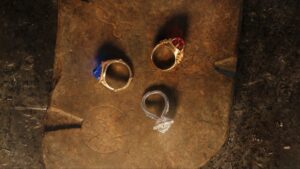
With a grand total of nineteen Rings of Power floating around in season two (minus the One Ring forged by and for Sauron alone), audiences can look forward to appearances from the future owners of the Seven Rings made for the Dwarves and the Nine Rings destined to enslave Men. On top of that, the first season came to an abrupt end before the Elves gathered to witness the forging of the Three Rings could decide who among them should wield these precious artifacts, leaving open the possibility that multiple high-ranking Elven-lords and ladies will vie for a Ring of their own before they inevitably come to rest on the hands of Galadriel, High King Gil-galad, and Círdan the Shipwright. The books and posthumously published writings of J.R.R. Tolkien are largely unhelpful for theorists, offering only a vague account of how the Rings of Power were distributed – which means there’s no predicting how Amazon’s adaptation of this story will play out.
At one point, Tolkien toyed with the idea that the Rings of Power had originally all been made for Elven wearers, and that it was Sauron who later went amongst Dwarves and Men, handing out the sixteen Rings he had stolen from Celebrimbor’s forge when he sacked the city of Eregion. I can easily believe that Men, with their short lifespans and shorter memories, would fall for that trick, but it’s never made much sense to me that the Dwarves of Khazad-dûm, who promptly closed their doors in Sauron’s face after Eregion was sacked, would reopen them for any mysterious stranger bearing Rings that could only have been made in Eregion. I’ve always preferred the account passed down by the Dwarves themselves; that Celebrimbor himself presented a Ring of Power to King Durin III, making at least one out of the Seven a true token of friendship between Elves and Dwarves.
The identities of the other Ringbearers also eluded Tolkien, or else he never gave the matter much thought. It is generally assumed, for good reason, that the rest of the Seven Rings were given to the heads of the seven Dwarven clans (Longbeards, Firebeards, Broadbeams, Ironfists, Stiffbeards, Blacklocks and Stonefoots), but I do not believe that this is actually confirmed anywhere. It’s theoretically possible that two or more Dwarf-lords of a single clan each received a Ring, and that some clan leaders steadfastly refused to accept Rings at all. Seeing as the Dwarves were generally far more resistant to the corrosive powers of the Rings than Men or even Elves, it would not surprise me if that were the case. The names of the nine Men who became Sauron’s Ringwraiths were either lost to time or suppressed, all save one; Khamûl, the Shadow of the East, who was second-in-command to the Witch-king of Angmar.
That’s the story we’ve been told, anyway. Amazon intends to tell their own, and it seems to me that there are already a few original characters (i.e. characters invented for The Rings Of Power, who didn’t exist or weren’t named in Tolkien’s works) that have been set up in season one to become Ringbearers in season two, amongst them Durin IV and Disa of Khazad-dûm, Bronwyn and Theo of the Southlands, and Kemen of Númenor. The concept alone may offend some Tolkien purists, but allow me to lay out the argument for each of these non-canonical candidates.
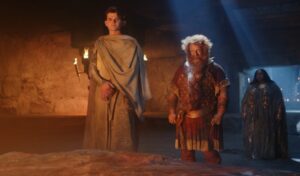
Representing the prestigious Longbeard clan as the main Dwarven viewpoint character in the series, Prince Durin IV is the most obvious choice to receive the Ring of Power given to his father by Celebrimbor in the semi-canonical version of the story only sketched out by Tolkien. He is, at any rate, far more likely to accept the gift without questioning its origins than his father Durin III, who in Amazon’s retelling is deeply distrustful of the Elves and all their handiwork. The Ring, with its tendency to “inflame [the bearer’s] heart with a greed of gold and precious things”, would bring out the worst qualities in Durin IV, who unsuccessfully sought for six episodes to convince his father that the value of mithril (a precious metal coveted by the Elves, but only found in narrow crevices deep below the foundations of Khazad-dûm) far outweighed the dangers of mining it. With a Ring on his finger to assure him of his own infallibility, he would become insistent upon digging ever deeper in search of mithril, inevitably awakening the monster nestled in wait at the mountain’s roots.
I see these tragic events unfolding in Durin IV’s future as clearly as if they were already filmed, but whether his wife Disa make it out alive or not will depend entirely on whether she learns too late what Gandalf told Saruman in The Fellowship Of The Ring; that “only one hand at a time can wield [a Ring of Power]”, meaning that its bearer will soon become possessive of it and irrationally suspicious of anyone who offers to share it, even if only to ease the mental and physical toll it exacts. I fear that this once inseparable power-couple will break under pressure, and that while Durin is dragged down by the weight of his Ring to a dark and terrible place, Disa will be put in an extremely difficult position where she can choose to stick by his side, either for true love’s sake or in the naïve hope that she can make the Ring work for her too, or she can get out before she’s buried with him beneath falling monuments to their selfishness and greed, the only thing they ever truly shared.
We have yet to see any Dwarf-lords from the other six clans scattered across Middle-earth from the Ered Luin to the Iron Hills, and I doubt that The Rings Of Power will ever find the time or space to flesh out their stories anyway, but I imagine we’ll see the other Dwarven Ringbearers gathered in at least one scene, solely so that Amazon can replicate that iconic moment in the opening sequence of Peter Jackson’s The Fellowship Of The Ring, where the seven nameless Dwarf-lords hold up their Rings as one. Personally, I’m hoping for a little more diversity in Amazon’s version, because if Galadriel can get grouped in with the “Elven-kings” in the famous Ring-verse despite being a woman (and explicitly not even equivalent to a king amongst her own people), then there can be some Dwarven-women among the “Dwarf-lords” mentioned in the next line.
That brings me to the next character I believe might be tempted to get her hands on a Ring – Bronwyn of the Southlands, a humble human apothecary who became unexpectedly crucial in deciding the fate of Middle-earth after leading her people to a victory against the Orcs that was only overturned when Orodruin suddenly erupted, forcing her to flee to Pelargir with her family and other refugees at the end of season one. Not only is she now acquainted with the Dark Lord Sauron (albeit in the fair form of Halbrand, long-lost king of the Southlands), giving her the means to obtain a Ring of Power, she also has the motive to want one: she’s in love with an immortal Elven warrior named Arondir who has been around since the First Age and will still be around long after Bronwyn’s great-grandchildren are dead, which is sure to pose a problem in their relationship as they start to wonder what’s next for them now that they’re comfortably settled down in Pelargir.
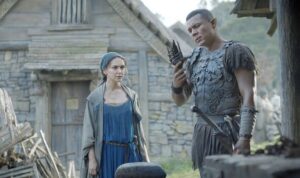
By a complete coincidence, the nine Rings of Power given to Mortal Men have the side-effect of extending their bearer’s lifespan long beyond its natural endpoint, something that sounds really appealing until you realize that the Rings can’t do anything to preserve your physical body or your mind, but will continue to puppeteer your undead husk for centuries until even that has crumbled away and finally all that remains is an overworked and exhausted soul tied to the world by the Ring on its nonexistent finger. If that fate awaits Bronwyn, it will be far worse than dying of old age, for death would come as a sweet release after an eternity of numbness.
Frankly, I’ve always felt that Middle-earth needs more women who are morally ambiguous in all the ways that men have always been allowed to be, so I wouldn’t necessarily object to Bronwyn becoming a Ringwraith, but I do have concerns that if her story goes down this route, it might gradually become the story of Arondir’s attempts to save Bronwyn from herself, rather than remaining focused on her – very relatable, and extremely Tolkienesque – struggle with the fear of death, so I’d like to hear opinions from women about how (or whether) it can be depicted without that happening.
Bronwyn’s son Theo has a rather more straightforward motive for desiring a Ring of Power. Ever since Waldreg stole the mysterious sword-shaped key that Theo had been using to stab himself so he could get high on blood loss and used it to activate Orodruin (why was the key shaped like a sword, anyway? I still have far too many questions regarding the key, the keyhole, and Sauron’s bizarre plan to anti-terraform the Southlands for there to ever be good enough answers), Theo has spoken about feeling powerless without it and wanting revenge on the Orcs to fill the gaping void in his life. While Sauron might not allow him to go that far, he can offer Theo something else – an even stronger drug that will silently kill off the parts of him that are good and innocent, reducing him to a vacant vessel ready to be filled with Sauron’s malice. The alternative, in my opinion, is that Theo becomes the King of the Dead, and either way he’s going to be trapped between life and death for a long time before getting peace.
Kemen, the weakly rebellious son of Pharazôn, is by far the least interesting and least sympathetic character who could potentially end up wearing one of the Nine Rings, but I have to believe there was a reason for writing him into the series, and this is the only one that makes any sense to me. Throughout the first season, in the few and far-between glimpses we caught of Kemen and his father interacting, we watched with second-hand embarrassment as the young man almost reluctantly matured – though only after his puppy-like attempts to please his father (“I was only trying to be clever”) were met with contempt. Kemen’s guilty anger emboldened him, and he thwarted his father’s imperialist agenda by blowing up a ship intended to set sail for Middle-earth, although he barely made it out of the conflagration alive. In season two, I expect Kemen to go to even greater lengths to sabotage (and at the same time, subconsciously impress) his father, and it would be most ironic if he only succeeded in enslaving his will to the Dark Lord.
Besides Kemen, it’s possible – though very unlikely, in my opinion – that another Númenórean, Eärien, will become a Ringwraith. I personally believe she will be lured to the dark side not by promises of power or eternal life, but by the opportunity to build the Temple of Morgoth in Armenelos where Sauron and Pharazôn will sacrifice prisoners-of-war and members of the Faithful arrested on false charges of treason, including Eärien’s own family. I will support her every step of the way, mind you, no matter what unspeakable crimes she commits to become the greatest architect in Middle-earth for one brief shining moment before it all comes crashing down around her, but for that climax to be truly satisfying I believe Eärien must surely die in the building she designed to last for centuries, like Thomas Andrews going down with the Titanic.

With the cast of The Rings Of Power expanding in season two, there’s a very strong chance we’ll soon meet other future Ringwraiths from Númenor, Middle-earth’s Southlands, and the currently uncharted regions of Rhûn and Harad. But I don’t know anything about these characters, and Tolkien left nothing for me to work with, so this is where I must sadly end. Of course, there is one more Ring, one of which I have not yet spoken, but that One was made for the Dark Lord’s hand alone, and it was only by chance (which some might call the divine intervention of Eru) that it was cut from his finger and later lost in the murky waters of the Anduin, only to be picked up by a hobbit or something akin to one, anyway. For the record, however, I do believe the One Ring will be forged in the season two finale, concluding Sauron’s irreversible descent into darkness.
So…which of the characters I’ve mentioned will actually get their hands on a Ring of Power when all is said and done, and which will become corrupted, transforming into horrible Ringwraiths? Share your own thoughts, theories, and opinions, in the comments below!
